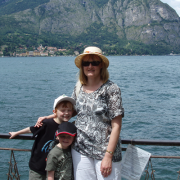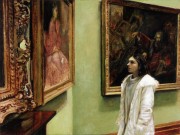Creativity in Pregnancy
Pregnancy changes us. Hormones flood our bodies and we have no option but to slow down and refocus. Much has been written, often based on anecdotal experience, about the effects of pregnancy on a woman’s behaviour; from welling up at the story of a lost cat being reunited with its owner to retching at the smell of raw meat – a side-effect that turned my hapless family vegetarian for months.
But one rarely discussed consequence of pregnancy is its impact on a woman’s creativity. Surely it’s inevitable that an experience which brings raw emotions to the surface and fundamental changes in our thought processes will have some impact on our creative output?
In recent years neuroscientists have attempted to quantify the effects of pregnancy and to document the behavioural changes long suggested by anecdotal evidence. A team of neuroscientists lead by Craig Kinsley, Associate Professor of Psychology at the University of Richmond in Virginia found that the specific influx of hormones during pregnancy and labour effectively rewire a woman’s brain and fundamentally change the manner in which she interacts with the world. What is particularly interesting is their conclusion that this transformation endures for far longer than nine months.
The results of this study, demonstrating that motherhood enhances learning and memory, were presented at the annual meeting of the Society for Neuroscience in 2011. The research, conducted on pregnant and recently pregnant rats, found that they were braver, more energetic and more inquisitive than previously. Pregnancy gave them the ability to complete complex mazes with fewer mistakes and retained knowledge for longer than before. The reason for this is that hormones such as oestrogen and oxytocin, released during pregnancy and nursing, dramatically enrich parts of the brain linked to memory and learning.
So, what of humans? Reported experiences seem to differ from woman to woman and while some women view pregnancy as a hugely creative time, others discern little change. Examples of pregnancy-related creativity are everywhere. Helen Dunmore wrote her Orange Prize winning third novel, A Spell of Winter while pregnant.
Novelist Barbara Kingsolver is reported as saying that she suffered from insomnia and is certain that her condition helped her to write her debut novel, The Bean Trees. Author Jodie Picoult wrote her first novel, Songs of the Humpback Whale while pregnant with her first child. Tania Unsworth, author of acclaimed novels ‘The Seahorse’ and ‘Before We Began’ had been putting off writing fiction for years but started writing fiction seriously during her first pregnancy. Orion will publish her debut novel for children, ‘The One Safe Place’ in spring 2014.
Irish novelist and poet, Evelyn Cosgrave found her first pregnancy to be a “very introspective time”. She wrote poetry, much of it focussed on the daughter she carried, but struggled to truly get to grips with her emotions. During her second pregnancy she started to write novels and found that the limited time available to her helped her to focus and let less important things slide. “I typed with one hand and fed with the other”, she recalls.
Fellow novelist, Amanda Hearty describes how the characters for her first novel Are You Ready, “just came to me” during the early stages of pregnancy. She completed her manuscript in just four months and had already written fifty pages of her next one by the time daughter Holly put in an appearance. During her pregnancy, Hearty also completed a script writing course and designed a board game.
Irish artist Margaret Corcoran painted her stunning award-winning series of paintings, An Enquiry whilst pregnant with her second daughter. The paintings, hailed as reminiscent of early Degas in style and composition, document her older daughter, Georgia’s investigation of the Milltown Rooms in the National Gallery of Ireland. Corcoran says, “They are really special to me and I don’t have any because they all sold. Georgia was twelve or thirteen at the time, at that transitional stage.”
So, how did pregnancy affect her work? “I sat at a table resting my feet on my tool box. I had lyric FM playing as I worked. I was quite big but experienced this very peaceful, centred, contented feeling. I had to work at pregnancy pace. I couldn’t sleep so I was up at six in the morning, greeting the day while everyone else slept.” Corcoran believes she was “definitely more intuitive when pregnant. These paintings are all about children, puberty and new birth. The green background – from a Degas – represents youth. I painted from photographs so I was painting every hair on my daughter’s head. I was incredibly intimate with one daughter and heavily pregnant with the other at this transient time in life.”
Each individual pregnancy allows an expectant mother to explore her creativity in different ways, and it isn’t easy for everyone. Writer Rebecca Brown says that in the early stages she was, “too ill, tired and preoccupied”. Now, just four weeks after giving birth she says, “I have lots of story ideas and plans.” The irrepressible and hugely creative cartoonist, Annie West is adamant that she “didn’t do a thing for about six years. Then that wonderful thing called school appeared; saved my career.”
It seems that the mama rats were right. Although the creative benefits of pregnancy may be delayed by morning sickness and demanding newborns, they do seem to linger on to the benefit of both expectant mothers and their delighted fans.
Eleanor Fitzsimons is a researcher, writer and journalist specialising in historical and current feminist issues. She has an MA in Women, Gender and Society from University College Dublin. In 2013, she won the Keats-Shelley Essay Prize with her essay ‘The Shelleys in Ireland’ and she is a contributor to the Romanticism Blog. Her work has been published in a range of newspapers and journals including The Irish Times, the Guardian, History Ireland and History Today. She is a regular radio and television contributor. Her first book, Wilde’s Women was published by Duckworth in the UK in October 2015 and in the US by Overlook Press in January.
Category: Being a Writer, Contemporary Women Writers, On Writing
Comments (8)
Trackback URL | Comments RSS Feed
Sites That Link to this Post
- Pregnancy Brain—Is It a Thing? | Good Times Ahoy! | February 27, 2015
- Why You’ll Never Be Able to Write While Pregnant, Or the Opposite | Tethered by Letters | February 14, 2015
- Why You’ll Never be able to Write while Pregnant, and Other Fairly Stupid Tales | christine PS stocke | November 13, 2014
- Featuring Women Writers on WWWB 2013 - Women Writers, Women Books | December 31, 2013
- Write On | August 28, 2013







Yes, certainly I found my intuition and creativity again after I had my children. A good but too rationale education system had destroyed it. I find each creative work now very similar to pregnancy, birth and nurture.
Very interesting article – have had three children and started to focus on writing fiction when I was pregnant with number 2. Complications and related ill-health gave me the kick up the backside I needed – had to take some time of work and decided to use it productively! Good thing, too – writing took a back seat when bambino arrived and the dreaded night-feeds kicked in!
Great blog Eleanor. Relieved to read that for lots of women their creativity increases during pregnancy. I was a disaster! Couldn’t even concentrate on reading a book…had to resort to ‘Good Housekeeping’ magazine…which isn’t too bad actually. Delighted that the talented and irrepressible Annie West’s creativity returned when her children started school. You can’t beat a few hours peace and quiet in the morning.